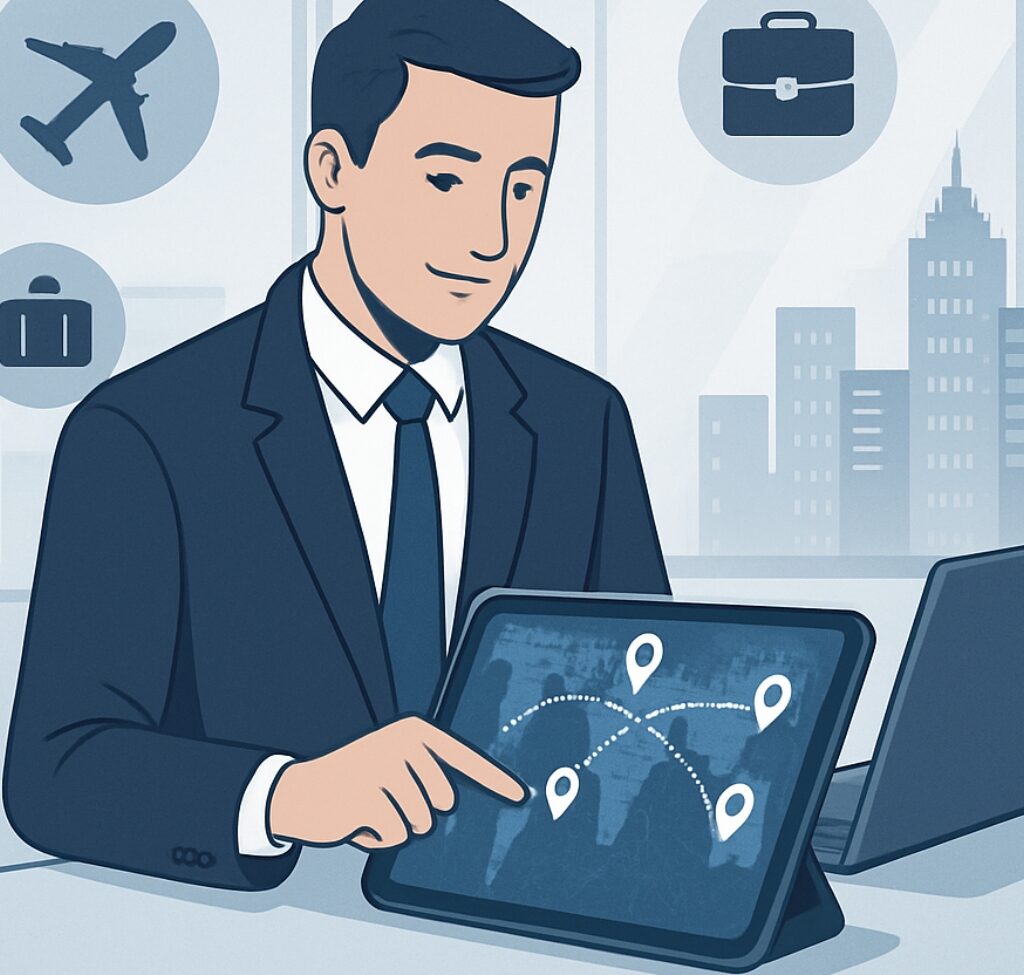Corporate travel managers make business travel, as they are the ones who provide easy and efficient travel to the employees. They manage travel programs, budgets, and the safety of the travelers. Their responsibility has changed from mere coordination to a strategic position that strikes a balance between the company’s objectives and the comfort of employees. They can establish a travel framework that enhances business by simplifying operations and establishing good relationships with their vendors.
Research and analysts point out the increasing significance of corporate travel managers in present-day firms. Studies indicate that they can help cut down the expenses via clever bargaining and implementation of policies. Analysts underscore their role in compliance and safety when they are on trips. Their business model makes traveling a valuable business asset.
Being a corporate travel manager is not merely a trip planning position; it is value creation. They make traveling a growth instrument, making sure that all its journeys are in line with company objectives. Their professionalism saves money, increases safety, and makes the experience of employees more satisfying.
Why do we have a Corporate Travel Manager?
A corporate travel manager is the one who manages the whole travel program of a company. They do all the trip planning the cost management. Therefore, they aim to ensure that business travel is efficient. They also make sure it is economical. They are also concerned with the safety and well-being of the travelers.
This position has been transformed greatly. Travel could be done by an office manager or a member of the HR team in the past. Nowadays, it is a professional role. Companies employ the strategic value of having independent travel managers. They enhance the efficiency of traveling. Another benefit of them is that they improve the travelling experience of the employees. An excellent travel manager strikes a balance between the company’s needs and the traveler’s comfort.

What is a Corporate Travel Manager?
A corporate travel manager position is a complicated one. There are a lot of tasks involved. To ensure no business stalls, these professionals have numerous hats. We shall examine their primary duties.
The Core Responsibilities of a Travel Manager
One of the important tasks is the development of the company’s travel policy. This document establishes the regulations of business traveling. It gives definite instructions to employees. This aids in making everyone know the procedures.
The policy normally involves:
- Certified reservation solutions and systems.
- Flight, hotel and transport spending limits.
- Regulations of various cities or traveling paths.
- A list of quality airline and hotel partners.
- The trip approval process.
- Expense reimbursement guidelines.
- Travel insurance and safety advice.
This policy is also updated by travel managers. Business needs change. Market conditions shift. The policy should be flexible to ensure it is effective. This makes the travel program up to date and effective.
Managing Budgets and Expenses
One of the major costs of a company is travel. These costs are regulated by the corporate travel managers. They also develop and manage the travel budget. Therefore, they can save money and still find a way to save money without making compromises.
They have financial obligations that include:
- Bargaining with the suppliers on prices.
- Watching the expenses to keep within the budget.
- Monitoring costs to find savings.
- Putting spending limits on credit cards.
A travel manager creates a delicate balance. They provide the travelers with a lot of room. They are also financially controlled. This guarantees the best out of the travel expenditure to the company.
Booking Trips and Coordinating Itineraries
Employees are booked by some travel managers. They have others supervising a system in which employees arrange their travel themselves. In both instances, they make sure that all the bookings are in accordance with company policy. They simplify the procedure of booking. This saves time for all concerned.
They deal with the arrangements of:
- Flights
- Hotels
- Ground transportation
- Car rentals
This is assisted with the aid of modern tools of travel management. Such platforms enable the employees to make their own travel bookings that are policy-compliant. This puts power in the hands of the travelers. It will also liberate the travel manager to attend more strategic activities.
Ensuring Traveler Safety and Support
A company is obliged to exercise a duty of care towards its employees. The travel manager plays a central role in accomplishing this role. They guarantee the security and safety of the travelers during the trips. This is particularly in the case of an emergency.
The safety roles are:
- Surveillance of risks to travel, such as natural calamities or civil conflict.
- Giving real-time notifications to the travelers on safety.
- Providing 24/7 contact to address such problems as flight cancellations or lost Luggage.
- Adopting crisis management strategies.
In case of interruptions, the travel manager is prompt. They rebook flights. They seek new places of residence. Thus, they go to any lengths to reduce the length of downtimes and ensure that the travelers are safe.
Establishing Vendor Relationships.
There must be good relations with vendors. There are negotiations with airlines, hotels, and car rental companies that are negotiated by travel managers. These alliances result in improved rates. They are also able to offer additional amenities to the travelers.
Examples include:
- Getting corporate discount deals on flights and hotels.
- Negotiating upgrades or extra checkouts.
- Obtaining special benefits programs.
Such relations save the company money. They also enhance the travelling experience of the employees. It is a win-win situation.
Analyzing Data and Reporting
Information is an effective tool for a travel manager. They gather and process data of all business travels. This information gives worthwhile information about the traveling program. It assists them in making intelligent judgments.
They analyze data to:
- Identify spending patterns.
- Ensure adherence to the traveling policy.
- Identify new cost-saving opportunities.
- Evaluate the value of the business travel.
Periodic reports on such measures are used to refreeze the travel program. They can change policies in accordance with actual information. This improvement process makes the travelling process more efficient in the long run.
Why are Corporate Travel Managers Important?
A travel manager is a committed travel manager who adds tremendous value to a company. They are not only booking flights. They develop and operate an entire travel program. This program is consistent with the objectives of the company. It also satisfies the needs of its employees.
Their significance is in many aspects:
- Cost Control: They manage one of the biggest corporate expenses. They are skilled in the areas of negotiation and budgeting, which saves the company money.
- Efficiency: They facilitate travelling. This saves on administrative work. It enables the employees to concentrate on their core jobs.
- Security: They have the responsibility for the well-being of the travelers. The risks are reduced, and their duty of care gives them peace of mind.
- Strategy: They utilize data in making strategic decisions. This enhances the travel program and business goals.
Conclusion
The corporate travel manager is not merely operational anymore. It has become a strategic activity. These professionals are not mere coordinators; they are the designers of efficiency and experience. They construct the structure, which enables a business to reach the world safely and cost-effectively. With business ever-growing internationally, the capacity of the Travel Manager to balance both cost and well-being of the employees is indeed a competitive edge.

